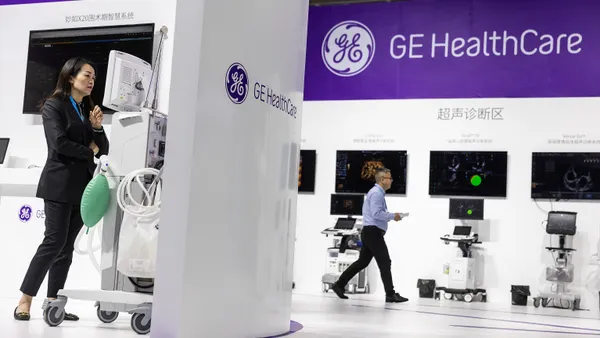Dive Brief:
- Digital health funding in 2025 is tracking ahead of last year as outsized fundraising rounds boosted the sector’s investment total, according to a report by Rock Health.
- In the third quarter, U.S. digital health startups raised $3.5 billion in venture capital funding across 107 deals. Funding for 2025 so far reached $9.9 billion, exceeding last year’s $8.4 billion raised through the third quarter, the venture capital firm and consultancy said.
- But startups are inking fewer middle-stage deals and avoiding rounds with a series label, Rock Health researchers wrote. Meanwhile, the sector is seeing a growing number of rounds worth $100 million or more, often backed by large, well-known investors.
Dive Insight:
Startups notched fewer funding rounds in the third quarter compared with earlier this year, but the check sizes were larger, according to the report. Average deal size for this year reached $28.1 million, increasing from $20.4 million in 2024.
Mega-deals, or rounds worth $100 million or more, have contributed to the trend. So far in 2025, the sector recorded 19 mega-rounds — including artificial intelligence-backed documentation firm Ambience Healthcare, benefits platform Judi Health and AI medical search tool OpenEvidence — already surpassing last year.
Overall, huge rounds accounted for nearly 40% of the year’s total funding, bringing in $3.8 billion of digital health investment so far in 2025.
However, some investment trends that arose in the wake of the COVID-19 pandemic are persisting, complicating the typical startup fundraising cycle, Rock Health researchers wrote.
For example, unlabeled raises, where companies complete funding rounds without a traditional Series A or B label, increased in the first half of 2023.
That seemed like a temporary trend, as companies with high valuations inked during the pandemic needed more cash but hadn’t yet met milestones for another traditional round, according to Rock Health.
But so far in 2025, 35% of this year’s funding rounds have been unlabeled. That’s down from 44% in 2023, but far beyond the single-digit levels before 2021.
“These raises weaken the benchmarks investors and founders rely on to underwrite growth and complicate how enterprises assess which startups are ready to partner at scale,” Rock Health researchers wrote. “Two companies announcing unlabeled raises may be in very different positions—one extending runway on shaky fundamentals, another preparing for strong growth—yet they look the same from the outside.”
Additionally, fewer companies are inking middle-stage deals. Only 30 Series B raises were recorded through the third quarter, compared with more than 60 Series B raises on average annually over the past three years.
Along with the sustained increase in unlabeled raises, the lost middle rounds also contribute to the unclear outlook for investors and buyers about which companies are ready to scale, according to Rock Health.
Meanwhile, funding is flowing toward a narrower set of value propositions. Tools that handle clinical and non-clinical workflows for healthcare delivery — like AI documentation tools or revenue cycle management products — captured 42% of the sector’s funding so far in 2025.
The focus on augmenting healthcare workflow is pushing some startups to partner with or acquire other companies to add new capabilities, according to Rock Health.
M&A deal volume is up 37% from last year, with 166 acquisitions inked so far in 2025 compared with 121 for the full year 2024.
Correction: This article was updated to reflect corrections made to the report after publication. The timeline for companies raising Series B rounds was removed. Also, the average number of companies that raised Series B rounds annually over the past three years is 63.













